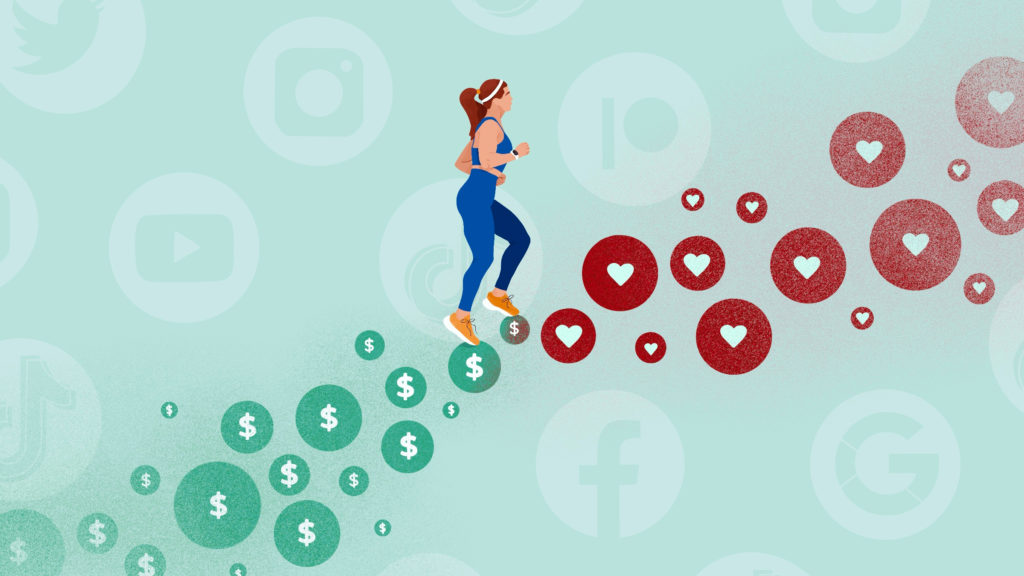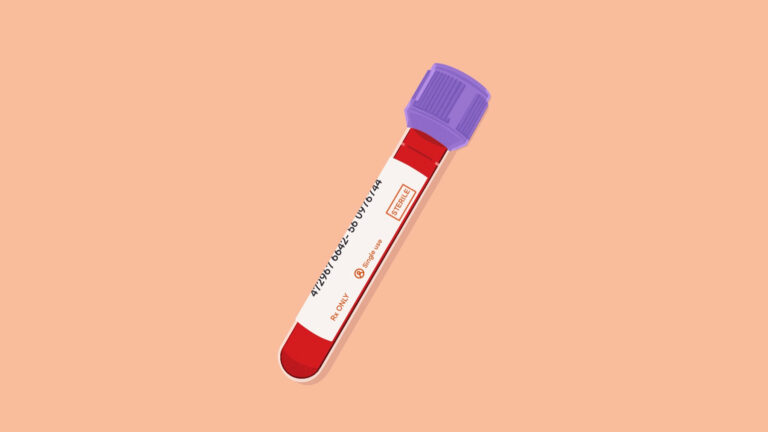Athletes, celebrities, and entertainers are increasingly investing in health and fitness companies.
Coming full circle, celebrity fitness instructors and wellness influencers are becoming highly sought-after investors and founders in their own right.
Pay-to-Play
From upstart to growth-stage, every company is searching for unique ways to boost growth and lower customer acquisition costs.
Easier said than done, distribution is a pay-to-play game dominated by gatekeepers like Apple, Amazon, Google, and Facebook.
- Apple’s App Store grossed more than $64B in 2020.
- Amazon, Google, and Facebook collect 50%+ of all US digital ad dollars.
- In 2021, digital media is expected to reach 61% of global advertising spend.
As Gartner vice president Andrew Frank put it: “It’s all about the data, and the fact that the data is concentrated in these particular companies gives them tremendous power.”
While these platforms work, brands risk becoming overly reliant on paid channels, making it difficult to scale efficiently or achieve profitability.
- Both e-commerce investor Clearbanc and Social Capital CEO Chamath Palihapitiya have said startups spend 40% of every dollar of venture capital on Google and Facebook ads.
Star Power
Beyond endorsement deals, brands like Hyperice, Tonal, and WHOOP are running the athlete-as-investor playbook to perfection.
From Issue No. 99, The Athlete VC:
“Companies tap athletes for awareness, distribution, and relevance in culture… helping brands avoid the tolls levied by platforms like Google, Amazon, and Facebook.”
Getting in on the action, celebrities and musicians are investing in fitness and wellness brands.
Instead of renting out their time or likeness, entertainers are backing startups that align with their personal brand and resonate with their fans. With incentives aligned, celebs can authentically rep a product, benefiting in the long-term upside.
Jay-Z has invested in at-home fitness companies CLMBR, LIT Method, and recovery tech brand Therabody, as well as Factor’s healthy meal delivery service and Impossible Foods.
Kevin Hart counts investments in supplement maker Nutrabolt, connected rower Hydrow, activewear label Fabletics, beverage brand Super Coffee, and Therabody, among others.
Mark Wahlberg is an investor in the F45 Training franchise, AQUAhydrate’s electrolyte water, and vibration training company Power Plate. He also co-founded Performance Inspired supplements and MUNICIPAL sportswear.
On the flip side, a number of health-focused companies like Super Coffee, Liquid I.V., and Flow Alkaline Spring Water have effectively leveraged high-profile investors to their benefit.
The New Guard
As attention fragments across different devices, platforms, and personalities, brands are being forced to adapt.
Ignoring ads and tuning out commercials, younger generations are increasingly drawn to content creators on YouTube and TikTok. Gen Z doesn’t fawn over mainstream celebrities or athletes—they’re all in on influencers.
As a result, the balance of powers is shifting, and creators are cashing in.
More than brand deals, creators are collecting equity stakes in exchange for their co-sign while also investing in startups and launching wholly-owned companies.
Josh Richards. With more than 36M followers across various social media, including 24.9M on TikTok, 19-year-old Josh Richards isn’t doing sponsored posts; he’s starting companies (like Ani Energy) and investing in startups. In March, Richards partnered with Goldman Sachs investment banker Marshall Sandman to launch Animal Capital, a Gen Z-focused investment fund.
Jimmy Donaldson. Better known as MrBeast, Donaldson has amassed 91M subscribers and 13B views across his six YouTube channels, making this 23-year-old one of the most popular creators on the planet. Donaldson employs upwards of 50 people to execute elaborate videos, build mobile games, and operate a ghost kitchen chain called MrBeast Burger. He’s also an investor.
Worth mentioning, Donaldson’s management company, Night Media, has innovated on the talent representation model, launching a $20M venture fund while also helping creators stand up owned and operated businesses.
Full Circle
Following a blueprint put forth by the likes of Richards and Donaldson, the creator class is reshaping fitness and wellness.
- The influencer marketing industry is on track to be worth $15B by 2022.
- There are 50M+ independent content creators, curators, and community builders.
From bootstrapped to a billion-dollar-plus brand, Gymshark credits influencers for its rise to prominence. More than marketing, when Thrive Market was turned down by more than 50 venture capital firms, the online grocer raised money from health and wellness influencers like bloggers Mark Sisson and Katie Wells, aka Wellness Mama.
Meanwhile, other influencers have made the jump from social media to entrepreneurship.
Kayla Itsines of SWEAT may be the best example — the app earns upwards of $100M/year in revenue as part of an exercise empire worth much more.
Far from an isolated case, Joe Wicks went from Instagram and YouTube star to author and investor. Blogilates founder Cassey Ho started an athleisure brand and recently launched a line of fitness equipment at Target. And US Army veteran Nick Bare leveraged YouTube to build the Bare Performance Nutrition supplement brand.
Looking Ahead
As celebrity instructors like Peloton’s Cody Rigsby (700K Instagram followers) and fitness influencer Demi Bagby (2.3M Instagram/13.8M TikTok/200K YouTube) harness the attention of loyal fans, brands will have to rethink their strategies.
Armed with more leverage than the brands themself, celebrity instructors could become investors in or co-founders of the next Peloton. Similarly, personalities that started on social media, like Bagby, Adriene Mishler, Lita Lewis, or Melissa Wood-Tepperberg, will go on to create or back a competitive product.
Meanwhile, there’s an opportunity for companies and investors to partner with or invest in fitness creators earlier in their development. For instance, imagine a Night Media-style management company providing resources to fitness and wellness creators.
Punchline: In the battle for instructor talent, user growth, and retention, the new guard is a force to be reckoned with.
🎙 On the Podcast
This week, on the Fitt Insider podcast, we’re joined by Anthony Geisler, founder and CEO of Xponential Fitness — a holding company of nine boutique fitness brands, including Club Pilates, Pure Barre, CycleBar, AKT, Stretch Lab, Row House, Rumble, YogaSix, and Stride.
In this episode, we discuss:
- Opening new studios during the pandemic
- Acquiring Rumble and adding more brands
- Xponential’s digital and connected equipment strategy
- Whether or not the company goes public this year
Listen to the full episode here.
🤫 Top Secret
Mindbody and ClassPass are exploring a merger, including options for going public.
How we got here: The pandemic’s impact on gym and studios led to revenue declines and layoffs at both companies. Lingering shutdowns and uncertainty about the future of brick-and-mortar fitness likely prompted M&A talks.
For context: Pre-COVID, Mindbody served some 60K health and wellness businesses. In 2018, Vista Equity Partners acquired the company for $1.9B. Meanwhile, after a number of pivots, ClassPass reached a $1B valuation in early 2020, raising $285M in Series E funding.
From the podcast:
- Our interview with Mindbody co-founder Rick Stollmeyer
- ClassPass CEO Fritz Lanman on the Fitt Insider podcast
The two companies are no stranger to each other. ClassPass uses Mindbody’s API to list studios. In recent years, as Mindbody evolved from an enterprise software into a consumer brand, it acquired dynamic pricing/inventory management companies, further encroaching on ClassPass’s domain.
TBD. As mega-merger takes shape, studio owners and other software providers are reassessing where they fit in.
🔥 Healthcare Heats Up
Amazon and Walmart are going head-to-head on the healthcare front.
Walmart acquired MeMD — a telehealth provider with 5M members offering 24/7 virtual care for urgent care, men’s health, women’s health, talk therapy, and psychiatry.
This move bolsters the retailer’s Walmart Health division, including 20 clinics offering primary care, urgent care, x-rays, behavioral health, dental care, and more.
Amazon Care signed its first client, inking a deal with Peloton-owned fitness manufacturer Precor.
The tech titan has been expanding into healthcare, launching Amazon Pharmacy, introducing its own health-tracking wearable, and making investments in the fitness space.
Earlier this year, Amazon filed paperwork to roll the virtual care service out nationwide.
Looking ahead: Whether its retailers like Walmart and CVS or tech giants like Amazon and Apple, everyone is vying for a piece of the trillion-dollar healthcare pie.
🔎 Investor Directory
We put together a list of 50+ investors focused on health and fitness startups.
Having raised capital a few times before, we know how taxing the process can be. Chatting with other founders, we heard how difficult and time-consuming it was for them to track down industry-specific investors.
So we started this list.
A few things to know. In terms of criteria, we tried to select firms who are primarily (>50%) or exclusively investing in consumer health and fitness, including sports and human performance, DTC healthcare, wellness, mental health, better-for-you-food and beverages, and more.
It’s not perfect, but we’ll continue to improve it as we go. Next up, we want to include angel investors with expertise in this sector.
If you’d like to suggest a firm or individual, there’s a form on the page — let us know!
📰 News & Notes
- Strava revamps its app.
- Equinox is testing the SPAC waters.
- Vitamin maker Ritual launches protein powder.
- Pepsi unveils functional sparkling water Soulboost.
- Sweetgreen teams up with tennis star Naomi Osaka.
- SLS, Mondrian, and Hyde hotels partner with Y7 yoga.
- Mondelēz selects nine better-for-you startups for its accelerator.
- Kin Euphorics announces Lightwave, its new non-alcoholic drink.
💰 Money Moves
- Planet Fitness made a minority investment in iFit, an interactive fitness platform owned by ICON Health & Fitness.
- Erling Haaland, a Norwegian star footballer playing for Bundesliga’s Borussia Dortmund, joined Hyperice as an athlete ambassador and investor.
More from Fitt Insider: The Big Business of Recovery - Stoko, a Vancouver-based “supportive apparel” company, closed $6M in seed funding.
- UK-based Remedy Health, maker of personalized 3D-printed vitamins, raised $11M in Series A funding.
- GEM, a supplement subscription company, raised $10.5M in seed funding.
- Vori Health, a provider of tech-enabled musculoskeletal care, closed a $45M Series A led by New Enterprise Associates (NEA).
- Virtual chronic care platform Vida Health raised $110M in Series D funding.
- Just Women’s Sports, a media platform for women’s sports, raised $3.5M in seed funding led by Will Ventures and joined by Kevin Durant’s Thirty Five Ventures, Drive by DraftKings, and others.
- The GIST, a provider of sports content, experiences, and community for women, landed $1M in funding.
- Madrid-based ifeel, a digital mental health platform, secured €5.5M ($6.69M) in Series A funding.
- MentalHappy landed $1.1M in seed funding led by Northwestern Mutual Future Ventures.
- Zenovate secured $1M in seed funding for its employee mental health and well-being platform.
- Sanctuary, an app for astrology and psychic readings, raised $3M in seed funding.
More from Fitt Insider: How Astrology Became Wellness - Prebiotic soda brand Mayawell has raised $2M in seed funding.
More from Fitt Insider: Gut Check - Better-for-you beverage maker Rowdy Energy raised $13M.
- Tennis star Venus Williams invested in plant-based marketplace PlantX.
- Nestlé Health Science acquired hydration supplement brand Nuun from TSG Consumer Partners.






